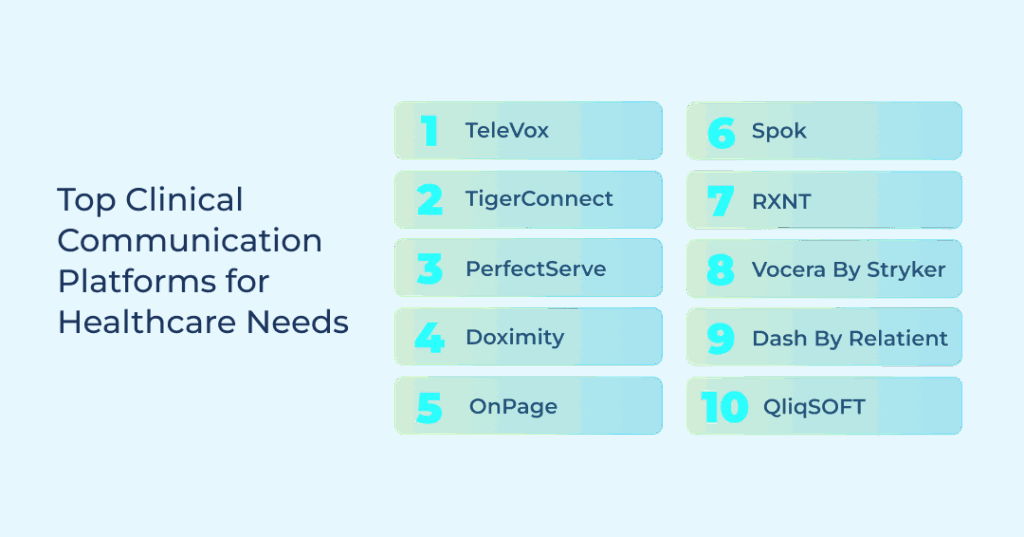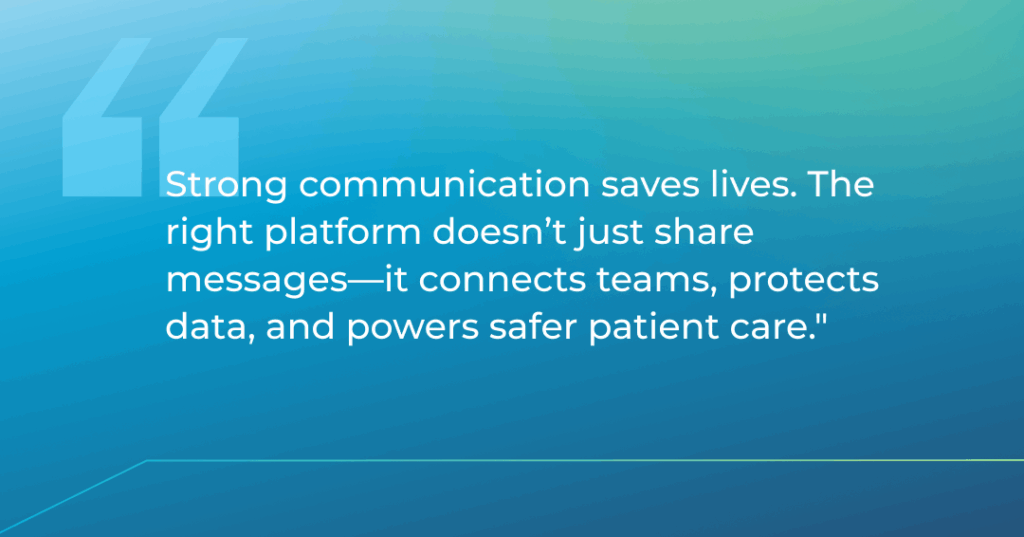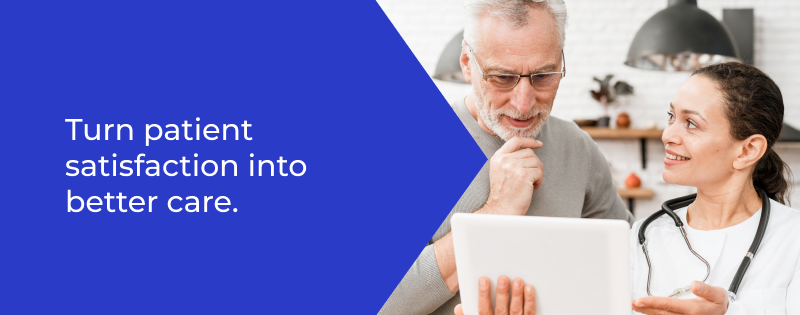Surveys are helpful, but they often hide underlying issues. Someone who was able to book…

10 Best Clinical Communication Platforms for Healthcare Providers
Everyone working in the healthcare sector knows what it means when a message is either delayed or sent to the wrong person. It’s not just dangerous but also irresponsible, especially in the eyes of your patients.
That’s why modern providers rely on dedicated clinical communication platforms. They not only protect patient information under HIPAA compliance but also optimize workflows and minimize errors that compromise patient safety.
On that note, we’ll be helping you choose the right patient communication platform for your practice so that all your interactions are accurate, secure, and timely.
What’s a Clinical or Healthcare Communication Platform?
A clinical communication platform is a specialized software that brings together messaging, calls, alerts, and workflows into one secure system for healthcare providers. It basically handles all your communication needs while complying with HIPAA standards.
The platform plugs right into your EHRs, so your staff can share patient updates, test results, and treatment plans between themselves without worrying about breaking any privacy laws.
Such healthcare communication platforms are necessary for modern providers. You can either jump between different tools and communication methods, which is highly inefficient and insecure, or fully coordinate from a single platform, making compliance easy.
That, as well as being able to send urgent messages to the right doctors or departments without the message getting lost in the chaos of a busy hospital day.
How Clinical Communication Platforms Are Important for Healthcare Providers
Crystal clear communication is one of the most important pillars for any healthcare provider. Everyone needs to stay on the same page for their patients. That’s where healthcare communications apps step in to take the lead.
- Medical errors drop when you can instantly share patient symptoms, medication changes, or urgent alerts through secure channels.
- Read receipts mean you know critical information actually reached the right person instead of wondering if your message got lost somewhere.
- Modern clinical communication and collaboration platforms can send urgent messages to staff in seconds instead of hoping they check their pager.
- Everything happens in one place. There’s no juggling multiple apps, phone calls, or sticky notes.
- Care teams work together in secure group channels. Everyone stays updated on patient changes without endless meetings or conference calls.
- Clinical platforms work on mobiles, making them excellent for telemedicine as well as remote workers.
- These platforms handle all compliance requirements (encryption, access controls, audit trails, etc) so you don’t have to.
Top Clinical Communication Platforms for Healthcare Needs
We picked these healthcare communication platforms based on HIPAA compliance, EHR integration capabilities, mobile accessibility, and secure messaging features. Each platform had to offer reliable alert systems, user-friendly interfaces, and proven track records in healthcare settings.

1. TeleVox
| Key Features | Ideal For |
| Conversational AI-Agent, SMART SMS, Digital Care Programs, Multi-channel secure communication, EHR integration | Healthcare organizations that need comprehensive patient engagement and automated communication workflows |
TeleVox covers everything from appointment reminders to post-discharge follow-ups through text(RCS/SMS), voice, email, and even postcards.
SMART SMS helps streamline patient communication, while Digital Care Programs use automation to reduce readmissions. There’s also TeleVox’s Conversational AI Agent, which works as an inbound virtual assistant to answer questions and support self-service needs.
One of the biggest advantages is how easily TeleVox connects with most EHR systems. You can be up and running in just a few days. Plus, the integration goes beyond the basics by enabling automated, personalized, two-way messaging with patients.
The wide range of features does mean your staff may need a little extra training to get fully comfortable. That said, the core platform is easy to use and covers most healthcare communication needs right out of the box.
2. TigerConnect
| Key Features | Ideal For |
| Secure messaging, Voice and video calls, Role-based directory, Message recall, Patient messaging capabilities | Hospitals and clinics prioritizing secure internal communication with basic patient engagement features |
TigerConnect lets you text individuals or groups, make voice and video calls, see when messages are read, and even take back messages if needed. Their platform’s directory system lets you find people by name or job title, which is helpful in big hospitals. The downside is that TigerConnect has limited customization options that you’d expect for the price range, like there’s no easy way to tag specific users in chats.
3. PerfectServe
| Key Features | Ideal For |
| Clinical communication optimization, Provider scheduling, Secure messaging, Clinical workflow management, EHR integration | Healthcare systems looking to connect communication with scheduling and workflow optimization |
PerfectServe offers an award-winning communication systems that improve clinical workflows and schedules. Their system connects with paging services like Spok and American Messaging, so test results are delivered instantly without anyone having to run back. However, your admin staff will need some time to figure out all the scheduling features, though. The learning curve is something users have often pointed out they’d like reduced.
4. Doximity
| Key Features | Ideal For |
| Professional medical network, Secure messaging, Clinical news feed, Medical research sharing, Physician directory | Individual physicians and medical professionals seeking professional networking |
Doximity is basically Facebook for doctors. You can connect with other physicians, share research, and message securely about patients. It’s great for networking and staying up on medical news. If you need serious team collaboration tools for your whole staff, you’ll probably have to pay extra for their enterprise features.
5. OnPage
| Key Features | Ideal For |
| Secure messaging, Critical alerting system, Patient-doctor calls, Contact syncing, Override DND settings | Emergency departments and critical care units needing reliable urgent alert systems |
OnPage improves the traditional pager concept. You send secure alerts that continue until acknowledged. The alerts can even override a phone’s silent mode, making the clinical communication platform good for patient calls and making sure critical messages don’t get ignored. That said, the additional security measures, like audit trails, are not part of the basic package. They cost extra.
6. Spok
| Key Features | Ideal For |
| Unified communication platform, Care team collaboration, Closed-loop communication, Secure messaging, Clinical alerting | Large healthcare systems requiring a comprehensive communication infrastructure with advanced alerting capabilities |
Spok brings all your communication together in one place. Their clinical communication platform connects directly with nurse call systems and makes sure urgent alerts reach the right person. Another plus is that it works across different devices, so your important updates are received regardless of whether they are using a phone or a pager. The only catch is that setting it up in a big hospital can be complicated and usually needs extra help from the IT team.
7. RXNT
| Key Features | Ideal For |
| EHR integration, Practice management, Patient portal, Clinical messaging | Small to medium practices wanting integrated practice management with communication features |
RXNT bundles healthcare communication software with practice management and electronic health records. You get patient messaging through their portal, plus all the usual tools to manage clinical workflows like prescriptions and scheduling.
The downside is that RXNT requires you to stack different modules together, meaning you have to commit to their full ecosystem to really get your money’s worth. Sticking only with their communication tools just won’t deliver the same value compared to using the complete suite.
8. Vocera by Stryker
| Key Features | Ideal For |
| Voice-activated communication, Hands-free messaging, Clinical workflow integration | Hospitals and surgical centers needing hands-free communication for sterile environments |
Vocera is best known for hands-free, voice-activated communication via their wearable badge devices and smartphone apps. This is especially useful in sterile conditions such as operating rooms, where the staff cannot readily step away to use their phones or pagers. You just have to say a name, role, or extension for the software to reach the person.
9. Dash by Relatient
| Key Features | Ideal For |
| Clinical communication, Care coordination, Patient engagement, Workflow automation, Analytics dashboard | Healthcare organizations focused on care coordination with data-driven communication insights |
Dash focuses on making care coordination work better with their clinical communication platform. They give you dashboards to see how well your communication is actually working and whether patients are staying engaged. The fancy reporting and analytics usually cost more, so budget for that if you want the full picture.
10. QliqSOFT
| Key Features | Ideal For |
| HIPAA-compliant messaging, Patient engagement, EHR integration, Workflow automation, Digital outreach | Healthcare practices seeking comprehensive patient communication with strong compliance features |
QliqSOFT does HIPAA-compliant texting, virtual care, and digital patient outreach. They’ve positioned themselves as an alternative to several other platforms, including Vocera.
The system automates a lot of the outreach work that used to require phone calls. It also offers chatbots for appointment reminders or FAQs, which keeps staff workload down. Getting all the enterprise features working usually means paying for professional services to set everything up right.
Choosing the Right Clinical Communications Platform for Your Needs
Pick the wrong clinical communication platform and you’ll face data breaches, workflow chaos, and regulatory fines that can cost your organization thousands. That’s the kind of pressure healthcare organizations are under every day. It’s why you need to be careful in getting the right solution the first time.
Features You Should Consider
HIPAA Compliance: Look for end-to-end encryption and detailed audit trails. Basic message encryption alone doesn’t ensure full regulatory compliance for any clinical communication and collaboration platform.
EHR Integration: Direct integration with patient records eliminates manual errors and keeps the information secure as it moves between systems. This determines whether your healthcare communication software can actually work with existing clinical workflows.
Role-Based Messaging: Different staff levels need different access permissions. Front desk staff shouldn’t see physician consultations, and clinical teams need varying access based on patient care responsibilities.
Escalation Protocols: Critical messages must reach available staff when primary contacts are unavailable. Look for systems that override phone silence settings during medical emergencies.
Reporting and Analytics: You need to track response times, message delivery, and system usage patterns. The platform you choose must have these metrics to help administrators identify workflow bottlenecks and optimize team communication effectiveness.
Questions to Ask the Provider
- How much time does setup and integration usually take?
- Which EHR systems does your platform integrate with directly?
- Can you show us documentation proving your HIPAA compliance?
- How do you encrypt data while it’s being sent and when it’s stored?
- What kind of audit trails does your system create?
- What are your typical response times for technical support requests, and do you offer 24/7 support for critical issues?
- How does pricing change as we add more users or locations, and are there hidden fees for mobile apps or integrations?
- Can your system handle our expected growth over the next few years?
- What is your system’s uptime guarantee, and how do you handle data backup and disaster recovery?
- Can you provide references from similar healthcare organizations and measurable improvements they’ve achieved?
How TeleVox Ensures Effective Communications for Healthcare Providers
At TeleVox, we believe communication should be a bridge rather than a barrier to care. That’s why healthcare providers across the country trust our platform to ease their workflows and keep patients on track in ways that are clear, convenient, and secure.
In addition to essentials like secure messaging, alert routing, and seamless EHR integration, we offer you something more: SMART Agent, our conversational AI. It’s a digital member of your staff, but one that doesn’t sleep or get tired.
For large hospitals managing thousands of patients every day, our AI-driven digital assistants free your staff by automating scheduling, reminders, and billing questions.
It’s the proven way to reduce no-shows, speed up response times, and handle patient volume spikes without burning out your team. That’s why TeleVox stands out as the communication backbone for enterprise health systems nationwide.
Schedule a demo today and see how we can help your teams coordinate better and start delivering great patient care.




